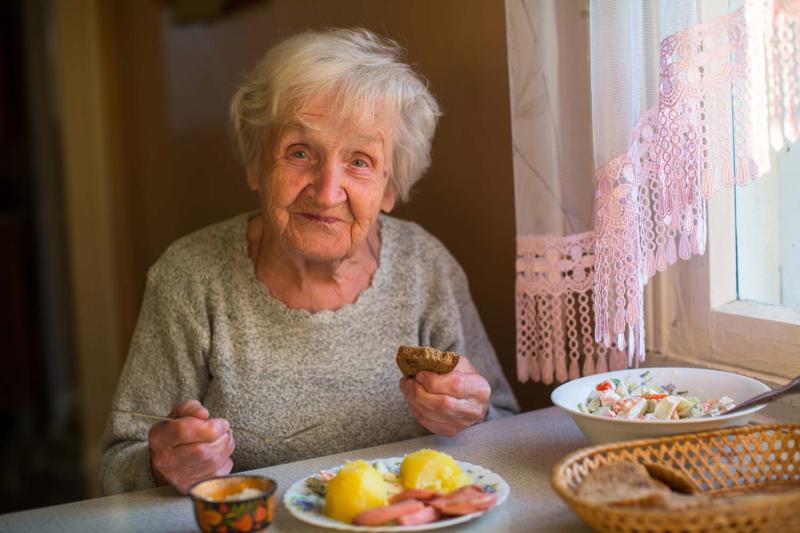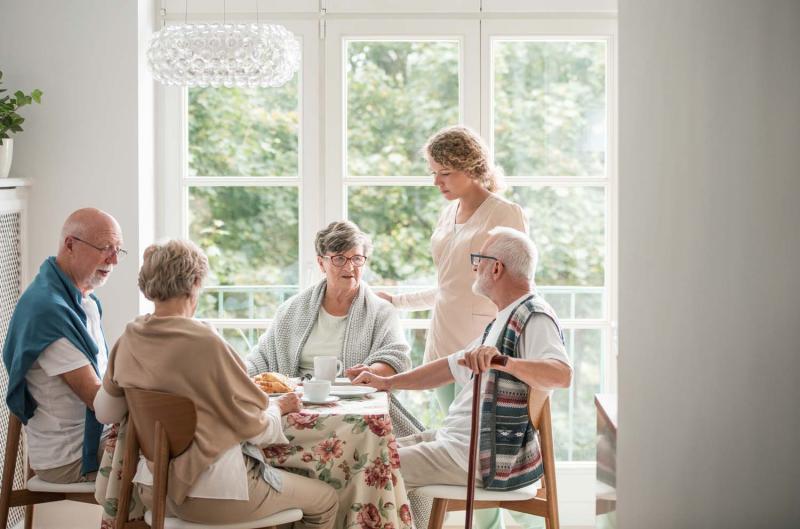Key points
- People with dementia may experience difficulties eating and drinking for a range of different reasons. These difficulties can have serious consequences such as malnutrition, weight loss, dehydration, and loss of physical strength.
- Montessori-based training methods have shown some success in helping people with dementia to complete mealtime tasks, especially when paired with ‘spaced retrieval’ techniques.
- Online or face-to-face feeding skills training programs for family carers and/or care workers can increase carer knowledge of feeding difficulties but do not appear to increase the amount people eat or lead to beneficial weight gain.
- One-on-one care worker assistance to people with dementia at mealtimes may improve their food intake.
- Changing the dining room environment or the way the food is served may improve food and drink intake during meals, however the quality of the research on this topic was low.
Some people with dementia experience difficulties with eating and/or drinking. These difficulties will be unique to each person and may be based on factors such as the areas of the brain affected, personality differences, or life history. [1] Common problems include difficulties swallowing, forgetting to eat, and not recognising food and drink or remembering how to use cutlery. [2] People may also experience changes in food preferences or appetite. The results can have serious consequences such as weight loss, malnutrition, dehydration, loss of physical function and strength, and increased susceptibility to infection and pressure ulcers. [1, 2] Researchers have looked at a range of ways to improve the mealtime experiences of people with dementia. Their aim is often to encourage people to stay at the table longer where they can socialise with others and get the nutrition they need.
This evidence theme on mealtime care is a summary of one of the key topics identified by a scoping review of dementia research. If you need more information on this topic, try using the PubMed search below.
Several types of interventions have been trialled to try to improve people’s mealtime experiences. These have mainly focused on increasing food and drink intake to prevent weight loss, dehydration, and malnutrition with its associated problems. These interventions can be grouped into:
- Educational and training interventions for people with dementia, their family carers, nurses, and care workers
- Mealtime assistance from nurses and care workers
- Changes to the dining room environment or food service.
No reviews reported potentially effective interventions to support healthy fluid intake. [3]
Education and training interventions
Montessori-based methods have shown some success in helping people with dementia to complete mealtime tasks, avoiding frustration and the risk of weight loss and malnutrition. [4-9] These methods may also increase the frequency with which people feed themselves without assistance. [9, 10] With this approach, an instructor breaks down eating tasks into small steps, demonstrating each in sequence while using simple language and visual clues to encourage the person with dementia to follow. Food intake might be improved further by adding ‘spaced retrieval’ to these activities. [10] Spaced retrieval is a technique for increasing memory retrieval. It consists of giving eating-related procedural information to people with dementia and asking them to recall this information at increasing time intervals. [11] As Montessori activities and spaced retrieval need to be repeated over weeks, they require a high level of staff time and training. [1] At this time, the findings may not be conclusive enough to justify the large financial investments that would be required to introduce these approaches. [8, 9]
Online or face-to-face feeding skills training programs for family carers, nurses, and care workers are shown to increase carer knowledge of feeding difficulties and ways to manage them. [9] Although findings varied as to whether they lead to longer mealtimes for people with dementia, more opportunities to try self-feeding or reduced feeding difficulties. [9, 11] Carer training programs do not appear to lead to increased food intake or beneficial weight gain for people with dementia. [1, 13] In fact, several studies show that eating difficulties increase with greater care worker knowledge. This might be due to increased staff ability through education to better assess the mealtime experience. [8]
Mealtime assistance
One-on-one care worker assistance to people with dementia at mealtimes is shown to effectively improve the food intake of people with dementia to a small extent. [1, 9] This assistance can be in the form of verbal prompts, positive reinforcement, and encouragement to continue with eating tasks and hand feeding. [9, 10, 13] Different types of hand feeding assistance techniques were found to have different degrees of benefit. The Over Hand technique, whereby the care worker places their hand on top of the resident’s hand holding cutlery, to help them guide the food to their mouth, had greater benefit than Under Hand or Direct Hand techniques. [9] However, the approach substantially increases the care worker’s time spent at the dining table during mealtimes. [11]
Changes to the dining room environment and food service
There is some weak evidence that suggests simple changes to the dining room environment, or the way food is served can lead to benefits for people with dementia. Changes showing a positive impact on food/drink intake include:
- Playing background music during mealtimes to encourage people to stay longer at the table, to communicate with other residents [14], and to reduce responsive behaviours [15]
- Shared mealtimes between staff and residents [16]
- Using strongly coloured tableware that contrasts with a white tablecloth to help people see their food [17, 18]
- Allowing people with dementia to serve themselves, rather than receiving a pre-prepared plate of food [19]
- Introducing well-lit aquariums with a viewing area at eye level [20]
- Employing a multicomponent intervention, involving: preparation of residents, environment, food and utensils; appropriate mealtime assistance; psychological care; and post-meal nursing care was reported as significantly improving feeding behaviours. [9]
Most of the reviews on mealtime care highlighted concerns about the methods used in their included studies. This reduces the degree of certainty we might have about some of the benefits of these interventions to improve the mealtime experiences of people with dementia. For example:
- Many studies only had a small number of participants. [3, 8, 9, 11, 13]
- Interventions varied in type, duration, and intensity across the studies, making it difficult to compare them and their outcomes. [1, 3, 11, 21]
- Studies often did not compare the effectiveness of mealtime care interventions across different stages of dementia. [10, 20]
- Individuals with dementia were not assessed to understand their specific needs and challenges with eating. Interventions were therefore not tailored to their problems. [1, 11]
- Interventions were mostly conducted in residential care, so there was little to no evidence about how beneficial these interventions may be for people living in the community. [3, 11]
- We do not know how well different factors of mealtimes that might have influenced the findings were controlled during the research (e.g., the quality of the care worker and resident relationship). [10]
- Studies were often too short to be able to detect changes in nutritional outcomes. [9]
For these reasons, several review authors concluded that there are currently no clearly effective or clearly ineffective interventions. [2, 3, 8, 21] They were therefore reluctant to make recommendations based on the existing low-quality evidence. However, it is unlikely that any of these approaches are likely to cause harm to people with dementia or care workers. [21]
Family carers and care workers may help to provide good mealtime experiences for people with dementia by considering the following points.
- Promoting mealtimes as pleasant and enjoyable times of the day may encourage some people to stay longer at the table.
- Try to tailor mealtimes to individuals, considering their abilities, needs and preferences. These may change daily or even meal by meal.
- Empower people with dementia to choose what they want to eat, as well as where and when they do so.
- Even if it takes longer, and depending on the individual, aim to let people eat without assistance. Try encouraging them to eat more.
- People with dementia should be regularly assessed for eating difficulties. This might require the expertise of a speech pathologist, occupational therapist, or nutritionist.
- Try some of the low-cost interventions such as playing soothing background music, trying different coloured tableware, and eating alongside residents.
- Encourage staff to support people with dementia as they eat, providing them with the time they need for people to enjoy their meals.
- Provide in-service training on assisting people with dementia to eat, the types of challenges they might have, and ways to encourage food intake such as providing snacks between meals.
- Leah V. Supporting people with dementia to eat. Nurs Older People. 2016;28(6):33-9.
- Faraday J, Abley C, Beyer F, Exley C, Moynihan P, Patterson JM. How do we provide good mealtime care for people with dementia living in care homes? A systematic review of carer-resident interactions. Dementia. 2021:14713012211002041.
- Bunn DK, Abdelhamid A, Copley M, Cowap V, Dickinson A, Howe A, et al. Effectiveness of interventions to indirectly support food and drink intake in people with dementia: Eating and Drinking Well IN dementiA (EDWINA) systematic review. BMC Geriatr. 2016;16:89.
- Lin LC, Huang YJ, Su SG, Watson R, Tsai BW, Wu SC. Using spaced retrieval and Montessori-based activities in improving eating ability for residents with dementia. Int J Geriatr Psychiatry. 2010;25(10):953-9.
- Lin LC, Huang YJ, Watson R, Wu SC, Lee YC. Using a Montessori method to increase eating ability for institutionalised residents with dementia: A crossover design. J Clin Nurs. 2011;20(21-22):3092-101.
- Wu HS, Lin LC, Su SC, Wu SC. The effects of spaced retrieval combined with errorless learning in institutionalized elders with dementia: Recall performance, cognitive status, and food intake. Alzheimer Dis Assoc Disord. 2014;28(4):333-9.
- Wu HS, Lin LC, Wu SC, Lin KN, Liu HC. The effectiveness of spaced retrieval combined with Montessori-based activities in improving the eating ability of residents with dementia. J Adv Nurs. 2014;70(8):1891-901.
- Fetherstonhaugh D, Haesler E, Bauer M. Promoting mealtime function in people with dementia: A systematic review of studies undertaken in residential aged care. Int J Nurs Stud. 2019;96:99-118.
- Chang HC, Spencer JC, Ho MH, Kasa AS, Ataiza C, Lambert K, et al. Effectiveness of interventions on feeding difficulties among people with dementia: A systematic review and meta-analysis. Australas J Ageing. 2023.
- Liu W, Galik E, Boltz M, Nahm ES, Resnick B. Optimizing eating performance for older adults with dementia living in long-term care: A systematic review. Worldviews Evid Based Nurs. 2015;12(4):228-35.
- Liu W, Cheon J, Thomas SA. Interventions on mealtime difficulties in older adults with dementia: A systematic review. Int J Nurs Stud. 2014;51(1):14-27.
- Chang CC, Lin LC. Effects of a feeding skills training programme on nursing assistants and dementia patients. J Clin Nurs. 2005;14(10):1185-92.
- Herke M, Fink A, Langer G, Wustmann T, Watzke S, Hanff AM, et al. Environmental and behavioural modifications for improving food and fluid intake in people with dementia. Cochrane Database Syst Rev. 2018;7:CD011542.
- Thomas DW, Smith M. The effect of music on caloric consumption among nursing home residents with dementia of the Alzheimer's type. Act Adapt Aging. 2009;33(1):1-16.
- Whear R, Abbott R, Thompson-Coon J, Bethel A, Rogers M, Hemsley A, et al. Effectiveness of mealtime interventions on behavior symptoms of people with dementia living in care homes: A systematic review. J Am Med Dir Assoc. 2014;15(3):185-93.
- Charras K, Frémontier M. Sharing meals with institutionalized people with dementia: A natural experiment. J Gerontol Soc Work. 2010;53(5):436-48.
- Dunne TE, Neargarder SA, Cipolloni PB, Cronin-Golomb A. Visual contrast enhances food and liquid intake in advanced Alzheimer's disease. Clin Nutr. 2004;23(4):533-8.
- Brush JA, Meehan RA, Calkins MP. Using the environment to improve intake for people with dementia. Alzheimers Care Today. 2002;3(4).
- Desai J, Winter A, Young KW, Greenwood CE. Changes in type of foodservice and dining room environment preferentially benefit institutionalized seniors with low body mass indexes. J Am Diet Assoc. 2007;107(5):808-14.
- Edwards NE, Beck AM. The influence of aquariums on weight in individuals with dementia. Alzheimer Dis Assoc Disord. 2013;27(4):379-83.
- Jackson J, Currie K, Graham C, Robb Y. The effectiveness of interventions to reduce undernutrition and promote eating in older adults with dementia: A systematic review. JBI Libr Syst Rev. 2011;9(37):1509-50.
Connect to PubMed evidence
This PubMed topic search is limited to home care and residential aged care settings. You can choose to view all citations or citations to articles available free of charge.


